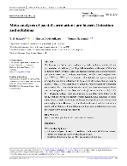Meta-analyses of partial correlations are biased: Detection and solutions

Datum vydání
2024Publikováno v
Research Synthesis MethodsRočník / Číslo vydání
15 (2)ISBN / ISSN
ISSN: 1759-2879ISBN / ISSN
eISSN: 1759-2887Informace o financování
MSM//LX22NPO5101
GA0/GA/GA24-11583S
Metadata
Zobrazit celý záznamKolekce
Tato publikace má vydavatelskou verzi s DOI 10.1002/jrsm.1704
Abstrakt
We demonstrate that all meta-analyses of partial correlations are biased, and yet hundreds of meta-analyses of partial correlation coefficients (PCCs) are conducted each year widely across economics, business, education, psychology, and medical research. To address these biases, we offer a new weighted average, UWLS+3. UWLS+3 is the unrestricted weighted least squares weighted average that makes an adjustment to the degrees of freedom that are used to calculate partial correlations and, by doing so, renders trivial any remaining meta-analysis bias. Our simulations also reveal that these meta-analysis biases are small-sample biases (n < 200), and a simple correction factor of (n - 2)/(n - 1) greatly reduces these small-sample biases along with Fisher's z. In many applications where primary studies typically have hundreds or more observations, partial correlations can be meta-analyzed in standard ways with only negligible bias. However, in other fields in the social and the medical sciences that are dominated by small samples, these meta-analysis biases are easily avoidable by our proposed methods.
Klíčová slova
bias, meta-analysis, partial correlation coefficients, small sample,
Trvalý odkaz
https://hdl.handle.net/20.500.14178/2700Licence
Licence pro užití plného textu výsledku: Creative Commons Uveďte původ-Neužívejte dílo komerčně-Nezpracovávejte 4.0 International







